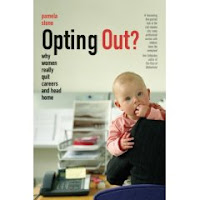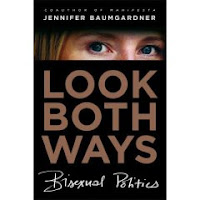According to my lame but stalwart built-in thesaurus, OPT (v) means “to choose something or choose to do something, usually in preference to other available alternatives.” Pamela Stone’s Opting Out? Why Women Really Quite Careers and Head Home is the book I’ve been waiting for.
Instead of focusing reductively on women’s “choices” (who has choices when alternatives are limited?), Stone charts the institutional obstacles and cultural pressures that leave even the most advantaged women feeling pushed out. Stone writes as a sociologist, a scholar of women’s careers, and a mother. But here’s why I love this book: Instead of blaming women, imploring us to “get back to work” (a la Linda Hirschman) or warning us (Leslie Bennetts-style) that we’re all making a dastardly mistake, her message is one that, as a Gen Xer staring into the crosshairs of burgeoning career and potential motherhood, is far more palatable to hear.
Stone lets her subjects — mothers in their 30s and 40s who “time out” from professional careers — describe their trajectories in unstructured interviews, giving voice to a group we have heard much about but have not heard. She lambasts the media for sensationalizing our so-called mass exodus — which, in truth, is not so massive and reflects neither a sea-change in values among feminism’s daughters nor the modernization of the feminine mystique.
Opting Out? fills a void — virtually no real research has been done before on women leaving careers — and it’s the question mark in the title that propels the book. Stone looks at who these women are who leave and head home (whether permanently or temporarily), why they walk away from years of training and accomplishment to take on “full-time” motherhood, and what happens after they do. She looks at the implications of their leaving for the workplaces they leave behind, and the impact their decisions have on other women — female coworkers and, especially, younger women embarking on careers. Loaded with facts and real data, the introduction alone is worth the price of the book.
Stone found that the women she interviewed quit as a last resort, and for reasons of work, not family. She calls their decision is “a kind of silent strike” and describes their failed efforts to re-invent the workplace in their image: “These women had alternative visions of how to work and be a mother, yet their attempts to maintain their careers on terms other than full-time plus were penalized, not applauded; it was quitting that earned them kudos.” Stone emphasizes that these women’s stories are not over, that most are still in the process of re-invention — but leaves us wondering, how will the next chapter unfold?
Anyone acquainted with the research knows that younger women and girls aspire to professional achievement. It’s made headline news. As a recent New York Times story and books like Courtney Martin’s Perfect Girls, Starving Daughters make perfectly clear, Millennial strivers are ambitious to the point of extremes. Daughters of a half-finished revolution, this generation (as well as my own) lives suspended between the expectation of a world ready to open its arms to us and the reality of a world not yet fully transformed. Books like Stone’s have the potential to rally without blaming, and incite without fear. Let’s hope it finds its audience — working women present and future pondering their limited options and the workplaces that, drained of such women’s talent, should have no choice but to change and offer us alternatives to heading home.





